Web Directory / Local Directory – Are They Still Relevant?
There once was a time when you had to register in basically as many web directories as possible to make yourself and your website relevant. Google even included this tactic in its guidelines.
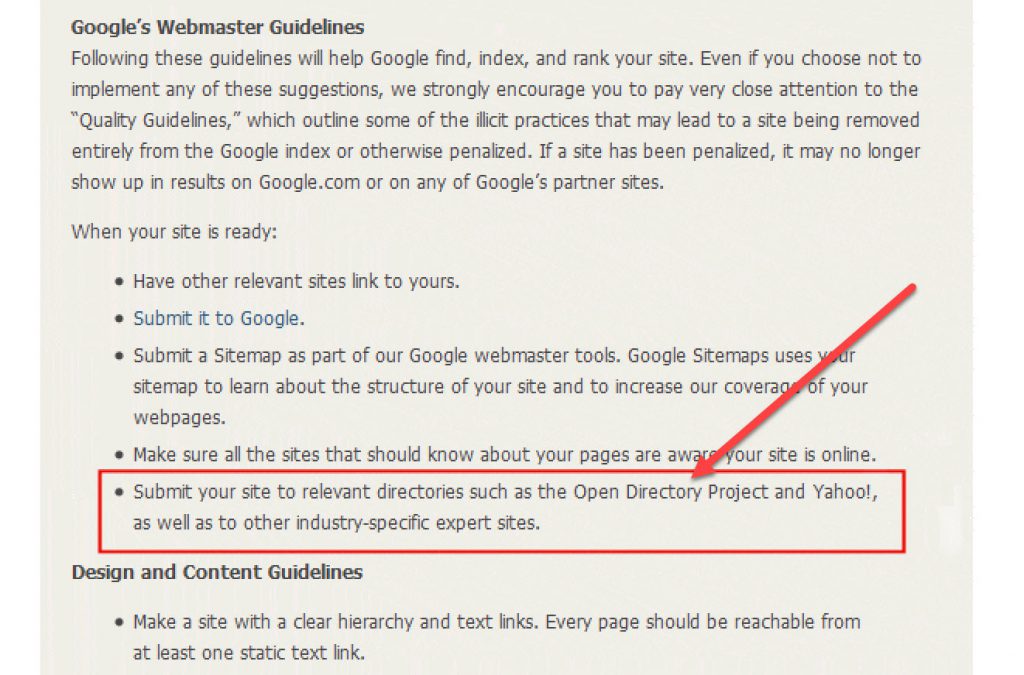
In the good old days, this was called “strategy.”
Today, we just call it spam. 💩
With new technologies, innovations, and discoveries concerning SEO and online success, are the web directory and local directory considered obsolete, or are they still useful?
According to the Head of Web Spam at Google, John Mueller, the general answer to this question is: no.
generally no.
— 🍌 John 🍌 (@JohnMu) February 25, 2017
However, we feel this question is a bit more complicated than that and deserves a little more digging.
What are Web Directories Really?
A web directory is an organized list of websites designed to make it easy to locate specific sites or topics.
These directories have gone by other names – subject directory and local directory, to name a couple – and they operate similarly to search engines. Both are used to find specific content online.
However, the main difference is human involvement.
When you use a search engine, your results are compiled and shown to you using automated technology. Web directories are handmade by human beings who manually add links to the platform.
A search engine will be more useful in finding sites that use a common keyword.
With that being the case, it’s more likely you will find a wide range of the types of sites in your results. When using a web directory, the websites you view will be arranged into common categories.
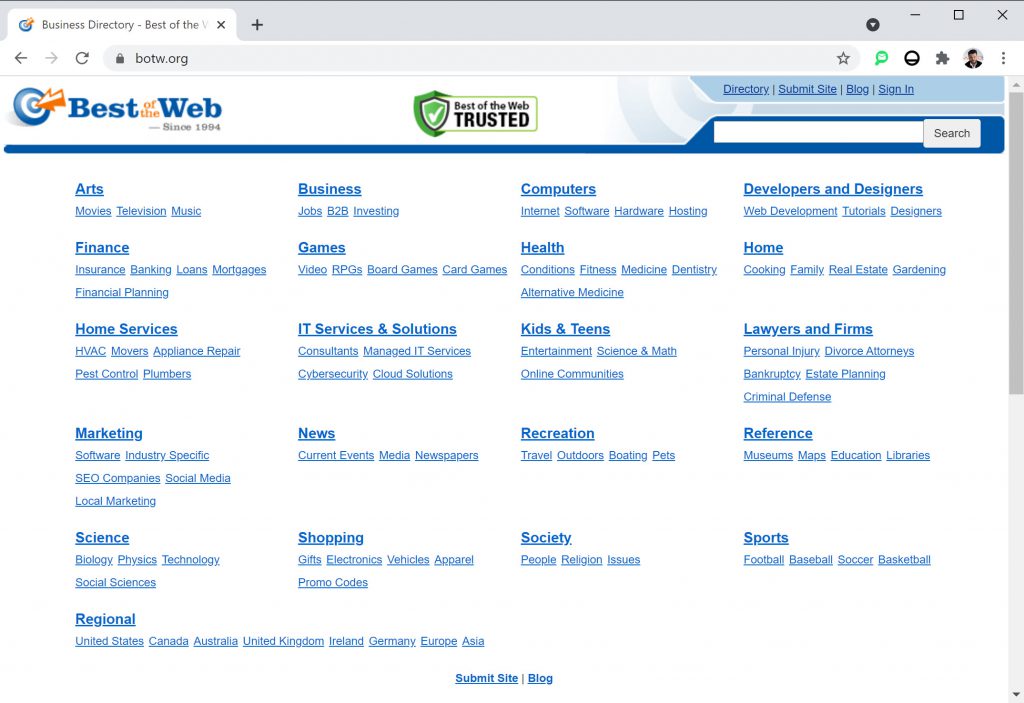
Why Directories Were Created
When the internet first came onto the scene, it was initially a US Military Project.
So, when it started becoming popular and available among everyday citizens, no one knew anything about building websites or optimizing searches.
Not surprising, based on these facts, there weren’t a whole lot of websites even available to browse.
The internet was rare, no one was making money, and no one could possibly see how huge this phenomenon would become.
However, as the technology became more and more useful, it also became more popular.
Once more people were online, more companies and individuals saw the benefit of creating websites. Of course, the more websites there were, the harder it became to remember all the site names. There was no Google and no other search engine, so users had to physically type in site names in order to access them. How was anyone supposed to know the names of all of the sites being created?
Enter: web directories.
Yahoo! Was the first company to introduce the idea of web directories.
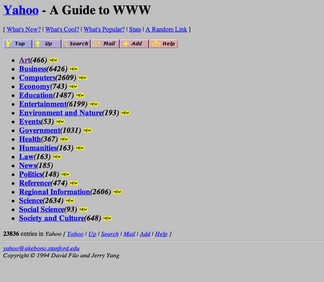
These professionals noticed that the internet was growing and saw that people needed a way to find all their favorite sites and discover the new ones added daily. They designed a web directory to store all the top websites, organizing them into categories.
It was a worthwhile investment for Yahoo! at the time because they could sell advertising space or manipulate search results for a profit.
Why Directories Died
Had the number of websites in existence stayed relatively limited, web directories might still be popular today. But as the number of sites continued to grow exponentially, the invention wasn’t so convenient anymore.
With hundreds and thousands of websites on these lists, it became a great hassle to scroll through and find the site you wanted. Even when sorted into categories, the lists were just far too long.

Eventually, someone came up with the brilliant idea of search engines. Sites like Google, Yahoo!, and Bing made it easier to find websites by using keyword searches. These search engines could filter through the noise and present users with the best possible results with these automatic results and detailed analytics.
The Web Directory Legacy
With the invasion of search engines and the innovation seen with search engine optimization tools, it would be easy to say that the web directory’s legacy is nothing more than a fond memory for older generations who actually remember using them.
However, web directories have taken on a new definition as individuals began using them for link building and online marketing. Obviously, this was not the intended use for web directories. But as their original intent became lost, website owners recognized that getting your name on as many directories as possible was good for SEO.
In the end, people would wind up paying small fees per directory to get their site listed. In fact, most of the directories’ visitors were only there to build their links.
Needless to say, this totally defeated the purpose of the directory in the first place.
Do Web Directories Still Work for SEO in 2021?
Despite what Google’s John Mueller said (“generally, no”), web directories likely still have an impact on your website’s rankings on search engines. The effect may not be very significant, but anything that’s going to positively affect your rankings is good, right?
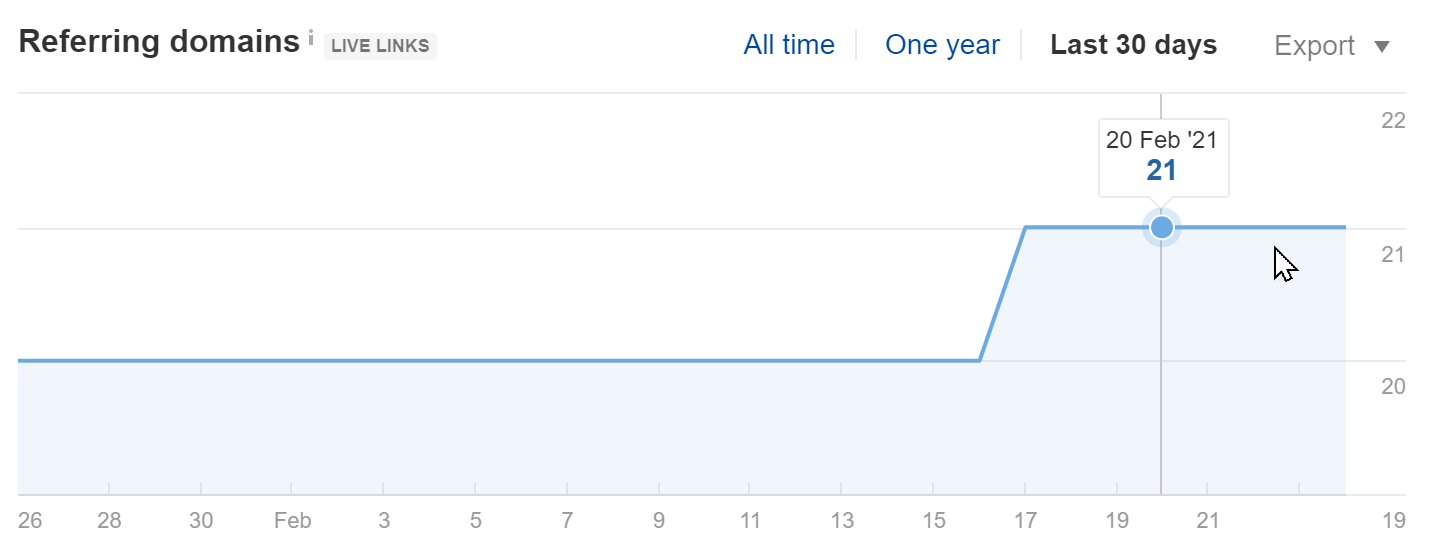
Think about affiliate sites that post your link on their webpage. To Google, this is seen as a positive thing that will help improve your status in the rankings. Having your link on web directory sites can potentially have that same effect.
However, the issue is kind of a catch-22.
While putting your link out there and having it present on other sites is generally a good thing, Google has also begun penalizing the use of web directories over the years as the tactic became more and more popular.
To Google, it’s kind of viewed as cheating the system.

So, the two ultimately are likely to cancel each other out. That doesn’t mean you can’t still try, but you shouldn’t expect thousands of visitors solely due to your directory presence.
The Problem with Today’s Directories
Aside from the meager chance that being in a directory will actually help your web presence, various other problems come along with today’s directories. You can expect to encounter these main issues:
- Web directories today are full of spam
- Today’s web directories are poorly managed (or not managed at all)
- Web directory platforms are inefficient and not worth the time
- Using web directories can result in penalties from Google algorithms
The above four issues are super familiar with today’s directories. With how large and in-charge Google has become, it’s not really a good call to try to trick them virtually.
That being said, not every single web directory falls under these categories.
There are still some high-quality directories that are well-managed, helpful, and exclusive for quality websites only. They may be few and far between, but finding one may actually benefit you. 🤫
The biggest question you need to ask yourself is if the web directory you’re thinking about using will add any value to users. If it doesn’t, it’s probably not worth it and could even hurt you in the end.
What Defines a Quality Web Directory?
That last section did end with a little shining ray of hope for web directories, in that directories are not entirely useless if they are high-quality. The question now becomes: how do I find a quality web directory? How do I know if it’s a good site?
There are a couple of rules of thumb you can go by to identify a good directory site. If the site is or includes any of the following, it’s worth a second look:
- Local Directories
- Relevant to your niche
- Good link profile
- Responsive moderator/manager
- Active social media account
- Manually validated (avoid “automatic referencing”)
- Seniority with Google
Generally speaking, web directories that include one or more of the above features and factors may help you and generate more web traffic. And using a quality site properly, rather than just spamming every site you come across, won’t look bad to Google.

What to Avoid When You Submit Your Website to a Directory
One of the biggest things you should avoid doing when submitting your website to a directory is spamming. Spamming entails submitting your site name to every single web directory you can get your hands on. As we’ve already mentioned, this is a huge no-no.
In addition, here are a few other things you should avoid doing:
- Submitting to sites more than once
- Submitting to sites that redirect to another address
- Submitting on mirror sites
- Submitting to sites that are “under construction”
- Submitting to irrelevant categories or regions
There are also two general rules you can follow that will help you when submitting to a directory.
Do Not Over-Optimize
Previously, some directories would offer to link your site to an optimized anchor. While that’s rarely the case anymore, be aware of when it could be a possibility. If you can use an optimized anchor, make sure you don’t abuse privileged wordings.
The phrase “visit our website” might sound good, but you should always use your site name or exact URL. An optimized link anchor might get you more traffic during the short run, but it will harm you overall.
Use Unique Descriptions
The easy thing to do would be to write out one description for one web directory link and copy/paste it for any additional directories you choose to use. Using this method would be a colossal mistake that will only harm your efforts.
Google algorithms pick up on duplicate content, and they do not like it. Each of your descriptions must be unique. With a short description, this task really isn’t too daunting. It might take a little extra time, but it will ensure that Google doesn’t ignore your efforts or penalize you for laziness.
Take the extra couple of minutes per post to write a unique description, or don’t post your link to these sites at all – that’s the bottom line.
How to Find a Directory Relevant to Your Niche
As we mentioned earlier, posting your website link in a directory relevant to your niche is always a better idea than spamming a directory that accepts every entry. The only obstacle here is finding these directories. There are two tried and true methods to accomplish this.
Target Google Search
Thanks to the invention and development of search engines, you can sort of work backward and find directories through one of these sites. This concept is a bit ironic, considering the primary purpose of the original directory was to find sites, and now you’re using a site to find directories.
And yet, we do what we have to do.
You can perform a targeted Google search by pairing keywords together to find the directories that will most benefit your website. For example, if you’re looking to list a cooking website, you might search cooking + directory + website.
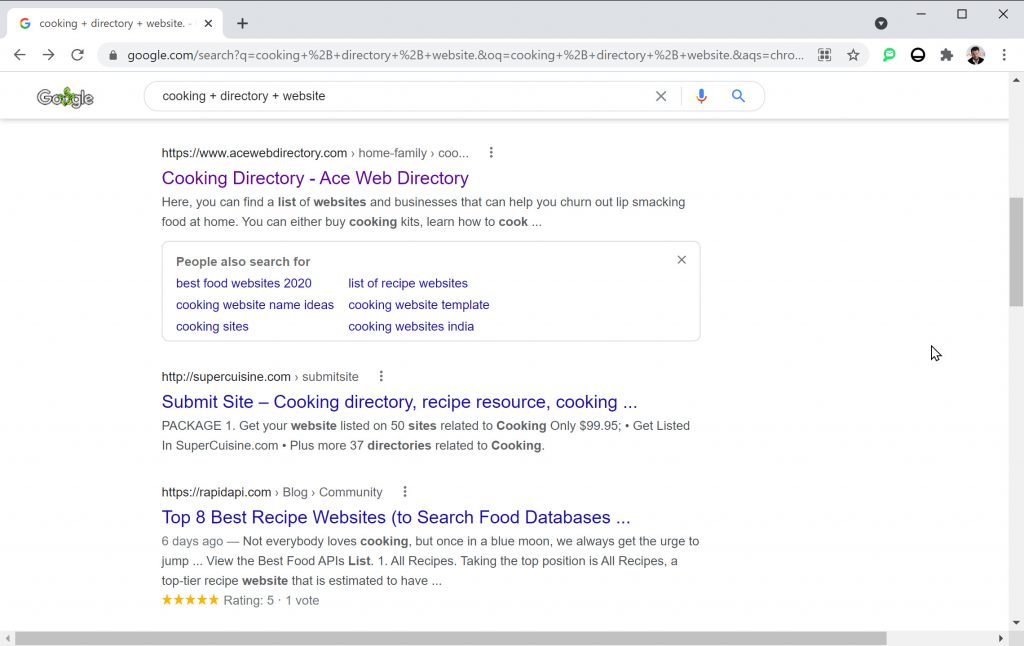
You can also use the filter tools on Google to narrow down your results and help you find your ideal directory faster.
Directory Directories
Yes, you read that title correctly. In the world of web directories, some directories list only directories.
These directories can be extremely useful in helping you find a directory where you can productively list your website. Directory directories can be a bit tedious to short through.
Many of them will contain inactive directories or ones that aren’t very high-quality. Essentially, you have to measure the directories against the same standards you use for listing.
We are maintaining one at SEO Buddy bundled with a Productivity Tool: The Link Chest.
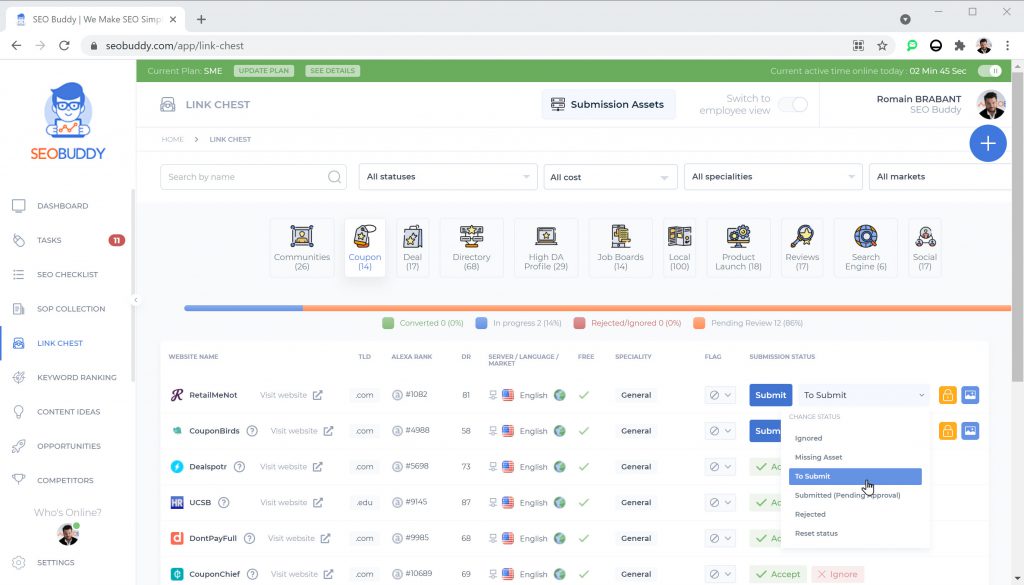
How to Find a Local Directory
Local directories are useful for dedicating your website to a specific geographical location. Likewise, local directories often allow you to add things like contact information along with your website link.
You can find a local directory in the same way that you perform a targeted Google search for other directories.
Just make sure you include the phrase “local directory” somewhere in the search and your area (i.e: local directory + London)
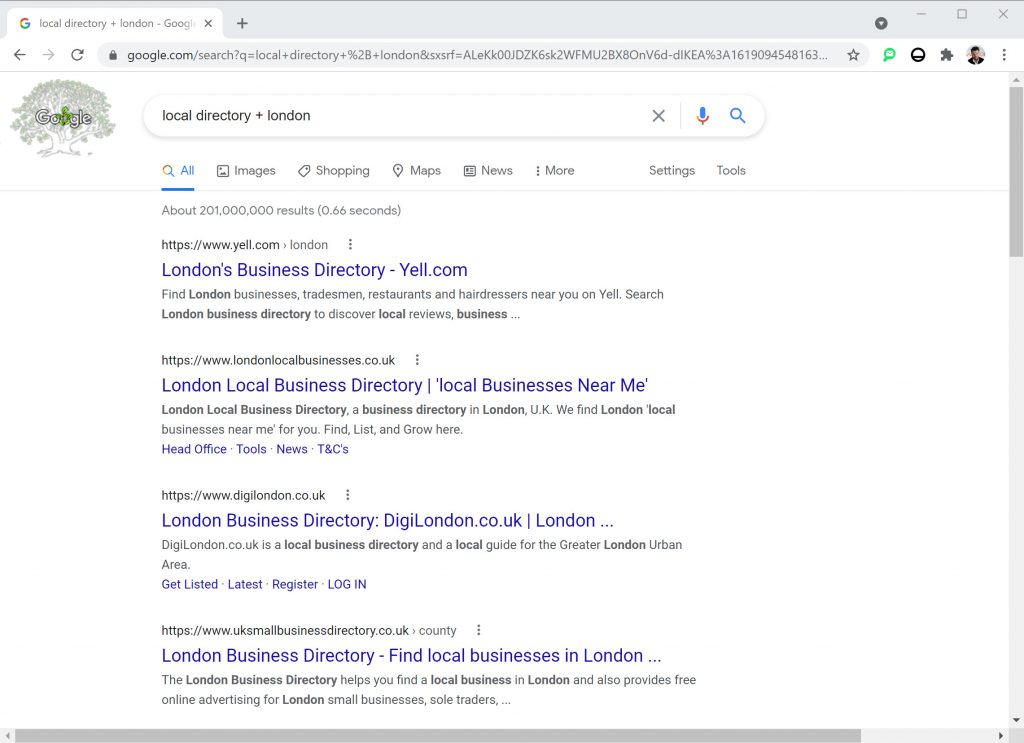
How to Stay Organized on Your Submission Effort
It’s essential to stay organized during the web directory submission process.
One of the best ways to do this is to keep track of the sites you’ve identified as high-quality, where you’ve contacted, and where you have been accepted using Google Sheet.
Designing or downloading a simple spreadsheet is a great way to keep all your ducks in a row. Like we mentioned before, submitting multiple requests to one site is a bad sign to Google, so you must keep track to avoid doing this.
Your directory submission may also require login and payment information.
These are other pieces of information you’re going to want to keep organized within your spreadsheet. If you stay organized throughout the process, you’ll end up with better results in the long run.
Or you can use the Link Chest by SEO Buddy, it provide all features to stay organized in this process.




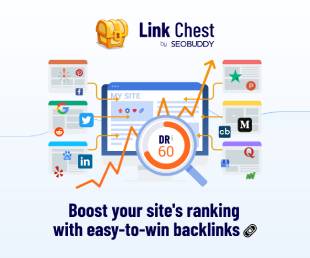
Thanks for sharing such an important posting. Yes, it is indeed true that for SEO in recent times, it is so important to list your business in high PR web directories to place your business listing to the top of the google search results and thereby to cater more traffic to your website.